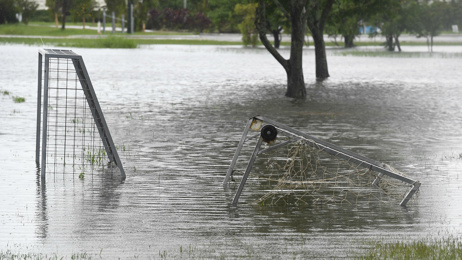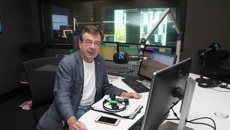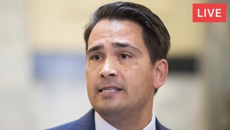Ahead of his last show, radio star Leighton Smith speaks to Phil Taylor about his long career, an outrageous punt, a dream home and finding love on the other side of the studio window.
At the outset, the Newstalk ZB icon who will next week leave the building after 33 years of being the Leighton Smith Show, prepares his interviewer for disappointment.
"You are about to discover," says Smith, dressed as usual in a prime white business shirt, "that I am a really boring interview. Nothing to say, terribly jealous of privacy."
/arc-anglerfish-syd-prod-nzme.s3.amazonaws.com/public/GW75WTNIH5A5TATR6PB2N57SZQ.jpg)
This polarising broadcaster - a climate change denier, Trump supporter and cycle lane loather - will later claim he is more a listener than a talker.
So we sit on facing sofas in a bach that by a series of additions and alterations has become a sprawling spacious North Shore home comprising two storeys and many rooms.
And then, Smith says, "Well, I wrote a book you know?
What about?
"Me of course!"
Leighton Smith: Beyond the Microphone was published in 2013. "I'll give you one, we'll cancel the interview and we'll open a bottle."
Hours later the interviewer leaves with both a copy of the book and a bottle of Smith's own Clevedon Hills Estate wine.
Chapter 5 begins with an undertaking: "As I understand that alcoholic drinks and tobacco are harmful, and realising the importance of having my mind and body strong and healthy to do the best in life, I therefore promise with the help of God, not to drink alcohol or smoke tobacco …"
The Australasian Temperance Society Junior Pledge is signed by a 14-year-old resident of Wahroonga in New South Wales named Leighton Smith. It came with the territory of being raised a Seventh Day Adventist.
Though Smith shunned tobacco, that chapter is an ode to the grape, specifically the vineyard he developed near Clevedon.
Clevedon Hills Estate is a homage to his favourite country. Designed by Italian architect Avio Mattiozzi, the building is modelled on the Villa Gamberaia outside Florence.
He chose angles to illustrate his book that played down the grandeur. Why, when the property may be seen as a reflection of his success?
"I'm not a show-off," he says. "I was raised not to use the 'I' word but I've overcome most of it. It's a different world now and doing what I have done you've got to talk about yourself.
"It was a grand house. I poured everything into it but I didn't want it as a hey-look-at-me house. I wanted to build my dream and I did.
"When I built it I thought I was going to die there and be buried under the lone pine down the paddock. You know, full of romantic ideas."
Turned out the land, the house, the dream anchored him through a turbulent period.
He bought the bare land from a dairy farmer in 1997, the year his marriage to the mother of his two sons ended, the year his father died. There had been loose talk of father and son establishing a vineyard in Australia.
He could have upped sticks and gone to America where his sister lives. He had a green card. "But I couldn't leave the kids."
Carolyn Leaney, the producer of his show, is his fourth wife. On air, Smith playfully refers to her as "Mrs Producer".
/arc-anglerfish-syd-prod-nzme.s3.amazonaws.com/public/UF2FO7GOQBG2TNRWVVVSK6GT4E.jpg)
He first married two weeks after his 19th birthday. His girlfriend was pregnant. The baby was stillborn and the "on and off" relationship ended after four years.
His second marriage - to a Sydney woman - was not helped by Smith moving for radio jobs to Townsville and then Wellington.
Little is said in the book about his third marriage other than it produced his sons.
"Having had three divorces," Smith tells the Weekend Herald, "if it had not been for Carolyn, I have serious doubts whether I would ever have got married again."
Leaney joined the show from a job as a producer at the BBC. They had worked together for 14 years and were friends before things changed in 2002. That year Leaney's relationship ended and Smith faced a health crisis.
"I was diagnosed with prostate cancer and her support during that period developed into what we have got now."
Leaney was one of a few people Smith told about his cancer. "That was an emotional moment that we recognised down the track a bit."
"Simplest way to put it is that I realised that friendship is the most important thing in a relationship and there was a gradual realisation that this one would work."
They got engaged in 2009 while holidaying in Colombo, Sri Lanka. A year later they bought the home they now share on a fulltime basis.
They didn't marry until 2012 after, says Smith, friends took them in hand and said, "Okay, this is what is going to happen".
/arc-anglerfish-syd-prod-nzme.s3.amazonaws.com/public/K2GGXZMSSVBBTLOZV6N6JIDLSQ.jpg)
It wasn't a case of fourth-time shy, he says. "We were just relaxed. We have a saying, the Smiths just put one foot in front of the other."
Together they make a blended family of six: Charles, 29 and Christian, 26 and Carolyn's daughters Madeleine, 26, and Charlotte, 24.
For five years as husband and wife they lived much of the week separately, Smith at Clevedon and Leaney in the house on the North Shore. That changed last year with the sale of the country estate.
Selling wasn't a wrench. "Carolyn will be the first to tell you I go through a period. I finish it and I move on and I don't regret. It is the same with Clevedon. I did it, I enjoyed it and I got what I wanted out of it."
Will it be the same when he signs off his show for the last time next Friday?
"It will be emotional."
Smith began in radio 44 years ago after short stints in banking, the public service, in real estate rentals and driving a taxi.
He recalls that on leaving Adelaide for Auckland more than three decades ago, his Australian producer told him he'd be "bored sh*tless in 18 months".
"I didn't think I'd be here this long."
He always had the love. As a boy he played with crystal radio sets and listened to radio series Tarzan and The Lone Ranger. "It was fascinating, it was theatre, theatre of the mind."
His success takes much more than a voice like rich gravy. He is a strong personality who seems to relish taking unpopular positions. A commentator once described him as a "cranky uncle".
/arc-anglerfish-syd-prod-nzme.s3.amazonaws.com/public/PFJQULBU2NECXDMXGOFWWN5LSU.jpg)
Asking Smith the key to his success doesn't help. "I never try to describe myself. I'm just me."
He was relating how ratings dived - from a 19 per cent market share to 15 - within weeks of him coming to Auckland in 1985 to take over from Alice Worsley. How did he respond? "I got pissed."
"People didn't like it, a popular host being bundled out, me being abrasive, rude sometimes. They weren't used to it."
Still rude? "I don't know. Certainly aggressive but there's been a lot of change. You grow into things."
"I'm paid to have opinions. If I didn't have opinions I wouldn't have been in the job."
A thick skin comes with the territory.
"Here are the current things where I'll have conflict with people. Trump, because I'm a Trump supporter. Climate change, global warming. American politics, in general, starting with the Constitution. I'm a believer in liberty, freedom, small government. I'm anti-drugs, [pro] self-responsibility."
No worries, then, about the leader of the free world?
Trump wasn't his first choice, he says. "I came into it as anything, anyone but Hillary. The Clintons. I detest the Clintons. Oh, don't get me going there. I think she is everything that I wouldn't want in a woman."
After Trump won, Smith's faith grew. "You have to live with the failings of the guy and they all have failings. The Kennedys were worse than him when it comes to women."
The hard questions
/arc-anglerfish-syd-prod-nzme.s3.amazonaws.com/public/5EVGGF7XDFDJDIVTVFDECXVABM.jpg)
Each opinion is a rabbit hole and as time is short Smith obliges with a round of quick-fire word association.
Climate change?
"Fraud. The whole climate thing is political science, not real science."
Petrol or electric?
"Whatever works most satisfactorily. At the moment and for the foreseeable future it is petrol. The planet is just fine thank you. Man does not control the climate, CO2 does not control the climate."
Just then a noisy boy racer roars down his quiet street. "Electric!," exclaims Smith, "I want electric!"
Lefties?
"Once upon a time they used to be nice but now they are just vicious b*******. You don't want to write that. Once upon a time, you could debate with them, we were all in the same boat wanting the same things. No longer."
Solar or fossil?
"Fossil." You won't find solar panels at Clevedon Hills. "Too unreliable. You haven't mentioned nuclear. It's worthy of investigation."
Greenies?
"Out of control. It's so old-fashioned to call them watermelons but the healthy Green movement has been captured by the political left. Control freaks. I want my plastic bags back!"
Education?
"Captured by the left. It's groupthink."
#MeToo?
"Spare me."
Bike paths?
"Blow them up."
Mrs Producer?
"Stunning. [long pause] My final destination."
At one point, he says, "What I'm interested in, corny as it sounds, is truth and establishing truth isn't easy anymore because discussion has been shut down. Kiwis, and it's not undesirable, still just want to live peacefully, they don't want to get into bun fights, which gives the advantage to any aggressor."
His opinions may be extreme but in person, he makes for easy company. It may be that he reserves his crusading for the studio. A quote from his book: "The only place I enjoy an argument is on the radio; between family and friends it disturbs me greatly."
We talk about job satisfaction. "At one stage it was the important people I'd meet."
/arc-anglerfish-syd-prod-nzme.s3.amazonaws.com/public/VIEZ7SVQABBJXP3SDXUQP5SEEM.jpg)
He shushed Margaret Thatcher, back in 1983, after the Falklands War. The phone connection was so bad he couldn't hear the Iron Lady. "It was really quite weird, telling the prime minister of Great Britain to shut up."
Favourite memories include times his influence helped others. After Sir Peter Leitch, aka the Mad Butcher, a longtime advertising on his show, revealed to Smith that he was fighting aggressive bladder cancer, Smith rang Sir John Key and suggested it would be timely to recognise Leitch's charity work.
Smith helped bring New Orleans pianist, singer and songwriter Dr John to New Zealand and talked him up until the gig was packed. "To most people, he's not a massive star but I love him. I've got to say I felt like a little kid, it was like Christmas."
Dr John, who battled alcohol and drugs, toured again six years later and over lunch said to Smith in a gravel voice, "Leighton, you are a blessing in my life."
Smith included a Dr John track - Such a Night - on Makin' Whoopee, a selection of Smiths favourite songs. The CD went gold and the framed award commemorating the feat is leaning against a wall in one of the loos waiting to be hung.
It's late afternoon when Leaney arrives home to find her husband and the interviewer watching horse racing. It is strictly business - evidence of Smith's astonishing good fortune.
Smith paid $2000 for a quarter-share in a thoroughbred named Pharaoh that had earlier sold for $500,000. It's a long story but the horse showed talent, broke down and one of the owners wanted out.
With first-time owner Smith in the team, the horse won its next two races and went on to win the Doncaster Handicap at Royal Randwick in 1994 and 1995, a race worth A$1 million then and A$3 million now.
We watch a replay of Pharaoh's storming finish to grab that first Doncaster by a nostril. It still exhilarates. "Better than sex!" exclaims Smith.
He backed the horse weeks before the race at odds of 100:1. On arriving home the next week Smith wrote a cheque that cleared his mortgage.
There was one more horse, a quarter-share in a $100,000 purchase that never won a race and was sold for $5000. With that, Smith knew he'd had enough.
He's sure it will be the same come Friday when he signs off his show for the last time. Don't look back.
But it's not the last you will hear from him. Smith will contribute a regular column and podcast for the Herald.
• Subscribe to the Leighton Smith podcast newstalkzb.co.nz/leighton
Take your Radio, Podcasts and Music with you









